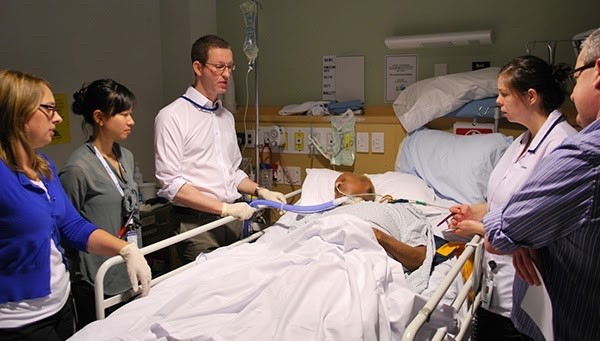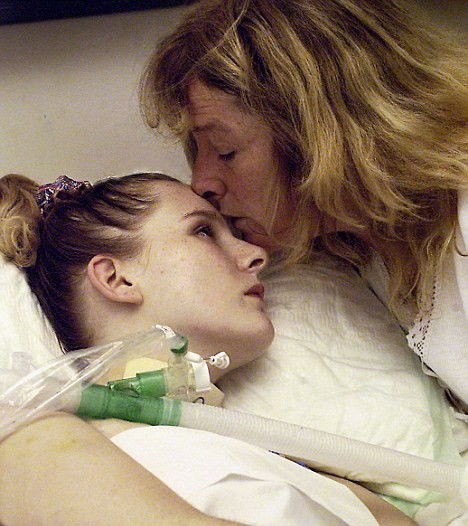Hi, it’s Patrik Hutzel from INTENSIVECAREHOTLINE.COM where we instantly improve the lives for Families of critically ill Patients in Intensive Care, so that you can make informed decisions, have PEACE OF MIND, real power, real control and so that you can influence decision making fast, even if you’re not a doctor or a nurse in Intensive Care!
This is another episode of “YOUR QUESTIONS ANSWERED“ and in last week’s episode I answered another question from our readers and the question was
Why COVID-19 Can Make Someone Critically Ill?
You can check out last week’s question by clicking on the link here.
In this episode of “YOUR QUESTIONS ANSWERED” I want to answer a question from one of my clients Megan, as part of my 1:1 consulting and advocacy service! Megan’s brother has a tracheostomy in ICU and Megan is asking if it is possible that they inserted central line to her brother to facilitate their devious plans.
Is it Possible that they Inserted Central Line to my Brother in ICU to Facilitate their Devious Plans?

“You can also check out previous 1:1 consulting and advocacy sessions with me and Megan here.”
Megan: You’ve got to watch him like a hawk.
Patrik: Yes.
Megan: Like a hawk.
Patrik: Yes.
Megan: Yes. So, do you think the PICC line is perhaps not as sinister? I mean they told me they didn’t have to tell me that they’d put it. I mean they could have put it on and I wouldn’t know, I presume.
Patrik: Yes, but somebody needs to give consent.
Megan: Oh.
RECOMMENDED:
Patrik: Have you given consent for a tracheostomy? I think we’ve talked about this last time.
Megan: Yes.
Patrik: You have?
Megan: Yes, I think so.
Patrik: Did you also sign a paper? Yes. Right. So then, you would have to sign a paper for a PICC line, too.
Megan: Right. But they’ve done it. They did it this morning.
Patrik: They’ve done it?
Megan: She said.
Patrik: Okay. Okay. All right. Okay, lets…okay.
Megan: But do you think it’s sinister or do you think it could just be-
Patrik: I don’t know and the reason, I don’t know if they took out the central line and put in a PICC line, I believe it’s the better approach.
RECOMMENDED:
Megan: Yes, but there’s nothing to get to-
Patrik: Well, what I’m worried about is why after all of these times…
Megan: They’ve certainly done it.
Patrik: Yes. And why does he still have it? Is he using antibiotics?
Megan: No, no.
Patrik: Right. So you know if somebody is on long-term antibiotics, you need a central line often or a PICC line, but if he’s not on that, then I’m wondering why. What happened?
Patrik: Tell them, just remind me, what’s happening with the dialysis again?
RECOMMENDED:
Patrik: No, he’s not having the dialysis. They said they would give him dialysis only if his kidney function started to fall below what they consider his baseline is and it hasn’t.
Megan: Okay, yes, yes, yes.
Patrik: There’s nothing happening there.
Megan: Yes, yes, yes.
Patrik: So again, most of the time when somebody is coming off the ventilator, they don’t need a central line anymore. However, do you know whether he’s… You said his blood pressure is fine, didn’t you?
Megan: Yes.
Patrik: All right. Sometimes the PICC line is needed for low blood pressure.
Megan: It does sometimes drop, but yesterday when I was there, the day before, it was good. Very good.
Patrik: Okay. But you don’t know whether that was with the support of any medication?
Megan: I don’t know what happened. I don’t know. No, I don’t know.
Patrik: Yes,
Megan: He’s certainly not on any pumps. That I can tell you. They’ve all gone.
Patrik: Oh, okay, okay. Okay, so then, okay, if he’s gotten. No, that is good information. If he’s got no pumps, I argue he doesn’t need a central line or a PICC line.
Megan: Right.
Patrik: So then I would definitely question why. If he’s got no pumps, then I would question why he needs a central line or PICC line, because that could be just to facilitate some devious plans.
Megan: Yes.
Patrik: I would really question why they want that.
Megan: Yes, the excuse she gave me was a bit lame. She said it means we can give him his medication without having to keep waking him up.
Patrik: Why they, I mean, if they give it down his nasogastric tube, they don’t have to wake him up.
Megan: Wake him up anyway. No, no?
Patrik: No, that I would definitely question.
Megan: Question it?
RECOMMENDED:
Patrik: Yes. So..
Megan: You think it is part of that plan?
Patrik: Yes, I think so. I really do. I really do.
Megan: Yes.
Patrik: Does he have the line already?
Megan: They’ve done it. She said they came and did it.
Patrik: Mm-hmm, then, I think if that’s the case, you need to probably push back a little bit harder, especially around consent.
Megan: Right?
Patrik: Because if you had to give consent for the tracheostomy, you should have given consent for the PICC line. Absolutely.
Megan: Right. I mean, he’s said to me, “You need to sign this,” but he did specifically say, “It means you understand what we’re doing. It’s not your consent.” He said that.
Patrik: It doesn’t sound right to me.
Megan: No?
Patrik: It doesn’t sound right to me.
Megan: No, so it was consent.
Patrik: Well, what doesn’t sound right to me is that you don’t need to give consent. That doesn’t sound right to me.
RECOMMENDED:
Megan: That doesn’t sound right.
Patrik: No, no. Because if, if Ryan was awake, was fully conscious person, well he would have to give consent.
Megan: Yes.
Patrik: Right, so why would then you would not have to give consent?
Megan: As this next of kin.
Patrik: Correct.
Megan: Yes.
Patrik: You know, they’re making decisions: DNR, tracheostomy. Yes, he needed to tracheostomy. Now they’re making decisions and you can ask why does he need a PICC line if all these drugs have been given through his nasogastric tube. It just doesn’t quite add up to me.
Megan: Yes, it’s a bit uncomfortable.
Patrik: Having said that, most of the time…Let’s just say when somebody is really approaching the end of life, but it sounds to me like that’s not the case.
Megan: No.
Patrik: That’s not the case. But let’s just say somebody is approaching the end of life…they have no IV access, okay? And they need access because otherwise, they would be suffering when it comes to the end of life.
Megan: Right.
Patrik: They don’t necessarily have to have a PICC line. It could be just a small, what’s called a peripheral line.
Megan: Right.
Patrik: Right, and that is if you’ve ever been to a hospital, maybe for a day procedure for a small surgery, you might get like a smaller IV line in your hand or something like that. Do you know what I mean? “
Megan: Yes, yes.
Patrik: Right, right, right. So you know that would be sufficient. I don’t quite get why, because the PICC line, it’s not like…for ICU terms it’s a fairly simple procedure but it’s not simple, simple either.
RECOMMENDED:
- YOU DON’T KNOW WHAT YOU DON’T KNOW WHEN YOUR LOVED ONE IS CRITICALLY ILL IN INTENSIVE CARE! (PART 1)
- YOU DON’T KNOW WHAT YOU DON’T KNOW WHEN YOUR LOVED ONE IS CRITICALLY ILL IN INTENSIVE CARE! (PART 2)
Megan: Right.
Patrik: Right, and that’s why I’m, I just can’t quite make sense why-
Megan: They’ve done it.
Patrik: Yes, why they’ve done it. If somebody is getting drugs through the nasogastric tube and they need a PICC line, the only indication is long-term antibiotics.
Megan: Right.
Patrik: Inotropes for low blood pressure. I don’t want to get too medicated here, but inotropes are the life support for low blood pressure.
Megan: Yes.
Patrik: Or Total Parenteral Nutrition, but he doesn’t need TPN. TPN is intravenous nutrition. He doesn’t need that by the sounds of things.
Megan: Nope.
Patrik: Right. So those are the only indications. Right? Or, very rarely sedation, but again your brother doesn’t need to be sedated.
Megan: No, he’s not being sedated.
Patrik: Right, right. So it doesn’t quite make sense. Are you going in there later today?
Megan: Yes, yes.
Patrik: You need to find all of that out because that is… There could be a simple reason for it, but with everything that they’re telling you and-
RECOMMENDED:
Megan: Yes, I think if they hadn’t said this to me yesterday, I wouldn’t really be so sort of suspicious of what they’re getting up to.
Patrik: Yes, yes.
Megan: The only bit of other positive news, Patrik, is that today is in the chair. They got the chair for him. He’s in the chair.
Patrik: Good.
Megan: He’s going to stay in the chair, she said, until two o’clock, I think. They are going to put him in the chair again tomorrow and they are going to continue with the weaning. So this was all positive and that was the plan.
Patrik: Yes.
Megan: With the weaning, to put him in the chair, to carry on with the physiotherapy.
Patrik: Great. That’s really good.`
Megan: So, that was good.
Patrik: Great. Great. Okay. That could because what often ought to happen is the hospitals always try to cover their worst-case scenario. Now what’s their worst case scenario? Well number one, it’s to look after a patient indefinitely with an uncertain outcome. That’s definitely what’s happening.
Megan: Yes.
Patrik: But the other worst-case scenario for them is they would be telling you, Oh, we’ll definitely get Ryan out of ICU alive and then it’s not happening. Right? And then you could say, well you’ve told me, you know…
Megan: You’re going to do this.
Patrik: That’s right. So, there’s a number of reasons why they say, including covering themselves.
Megan: Yes. Yes, and you know that. Yes, and particularly view, the rather optimistic outlook from the other consultant. Maybe he felt on reflection. Oh dear, I’ve been a bit optimistic with her. Maybe, I feel I said that.
Patrik: Yeah, and what often also happens is somebody reeling him in potentially.
RECOMMENDED:
Megan: Reeling him in?
Patrik: Yes.
Megan: Yes. These two, this Doctor Mara and this doctor whatever, the ones, yes.
Patrik: Somebody reeling him in.
Megan: Yeah, don’t fill her with all this optimism, because as you say, for them, the worst thing is a patient that they’ve got now stuck there and they’ve got no idea what the outcome is going to be. How long is it, no idea.
Patrik: How long is it?
Megan: Yes, and you know, Patrik, I think you are probably not surprised that this has happened at this time in the sense that there’s a kind of cutoff point where they just say this has gone on long enough, but surely they know that if they genuinely want to wean him off this support, it is going to take time.
Patrik: Absolutely, but do they have the time? That’s the question.
Megan: yes.
Patrik: Do they have the time? And then also, which I believe is a specific issue, not only in Northern Ireland, especially in Northern Ireland but also to a degree here. Let’s just see Ryan survives and gets out of ICU but still has the tracheostomy, potentially needs overnight ventilation, all of that, there is nowhere to go for these people.
Megan: No.
Patrik: So, this is a massive issue in most ICUs. They’re very good at saving lives; they’re fantastic. I see some very good at saving lives. But then, what does it look like when their life is saved? Where to from there?
RECOMMENDED:
Megan: Yes, yes.
Patrik: You know, where hospitals or the health system, in general, is falling short, whether it’s here or in the Northern Ireland, or in any other country for that matter is you’re getting people to survive in those high acuity environments, but we’re talking-
Megan: And then, what?
Patrik: Right, and that’s where the cold quality of life argument comes in, where people say, well, he or she wouldn’t have any quality of life. Well, yes, not with current follow on systems, follow on services, or lack of such.
Megan: Yes.
Patrik: You know, all the resources go towards saving lives and then what.
Megan: And then what? Yes. It’s this sort of throw everything at this person to save their life, but then what do we do with them?
Patrik: That’s right.
Megan: They’re not all going to be perfect. They’re going to be different. They’re going to be damaged.
Patrik: That’s right. That’s right. And then the question is what’s acceptable for somebody in terms of quality of life? How much time can a person have to recover? And the reality is that after a critical illness, recovery is not going to happen overnight.
Megan: No, because that’s what that doctor said. He said he will need three to four months of rehabilitation at home.
RECOMMENDED:
Patrik: Yes. Yes.
Megan: Do you think they’re also thinking of the cost?
Patrik: Oh, totally, totally. It’s all about the cost. It’s all about the cost and it’s all about not wanting to pay for any potential follow-on services. Now you look at this whole debate…I don’t know whether we’ve spoken about this last time…Mike T?
Megan: Mike T.
Patrik: Right? Or last year, Do you remember?
How can you become the best advocate for your critically ill loved one, make informed decisions, get peace of mind, control, power and influence quickly, whilst your loved one is critically ill in Intensive Care?
You get to that all important feeling of making informed decisions, get PEACE OF MIND, CONTROL, POWER AND INFLUENCE when you download your FREE “INSTANT IMPACT” report NOW by entering your email below!
In Your FREE “INSTANT IMPACT” report you’ll learn quickly how to make informed decisions, get PEACE OF MIND, real power and real control and how you can influence decision making fast, whilst your loved one is critically ill in Intensive Care! Your FREE “INSTANT IMPACT” Report gives you in-depth insight that you must know whilst your loved one is critically ill or is even dying in Intensive Care!
Sign up and download your FREE “INSTANT IMPACT” REPORT now by entering your email below! In your FREE “INSTANT IMPACT” REPORT you’ll learn how to speak the “secret” Intensive Care language so that the doctors and the nurses know straight away that you are an insider and that you know and understand what’s really happening in Intensive Care! In your FREE report you’ll also discover
- How to ask the doctors and the nurses the right questions
- Discover the many competing interests in Intensive Care and how your critically ill loved one’s treatment may depend on those competing interests
- How to eliminate fear, frustration, stress, struggle and vulnerability even if your loved one is dying
- 5 mind blowing tips & strategies helping you to get on the right path to making informed decisions, get PEACE OF MIND, control, power and influence in your situation
- You’ll get real world examples that you can easily adapt to you and your critically ill loved one’s situation
- How to stop being intimidated by the Intensive Care team and how you will be seen as equals
- You’ll get crucial ‘behind the scenes’ insight so that you know and understand what is really happening in Intensive Care
- How you need to manage doctors and nurses in Intensive Care (it’s not what you think)
Thank you for tuning into this week’s YOUR QUESTIONS ANSWERED episode and I’ll see you again in another update next week!
Make sure you also check out our “blog” section for more tips and strategies or send me an email to [email protected] with your questions!
Also, have a look at our membership site INTENSIVECARESUPPORT.ORG for families of critically ill Patients in Intensive Care here.
Or you can call us! Find phone numbers on our contact tab.
Also check out our Ebook section where you get more Ebooks, Videos and Audio recordings and where you can also get 1:1 counselling/consulting with me via Skype, over the phone or via email by clicking on the products tab!
This is Patrik Hutzel from INTENSIVECAREHOTLINE.COM and I’ll see you again next week with another update!







